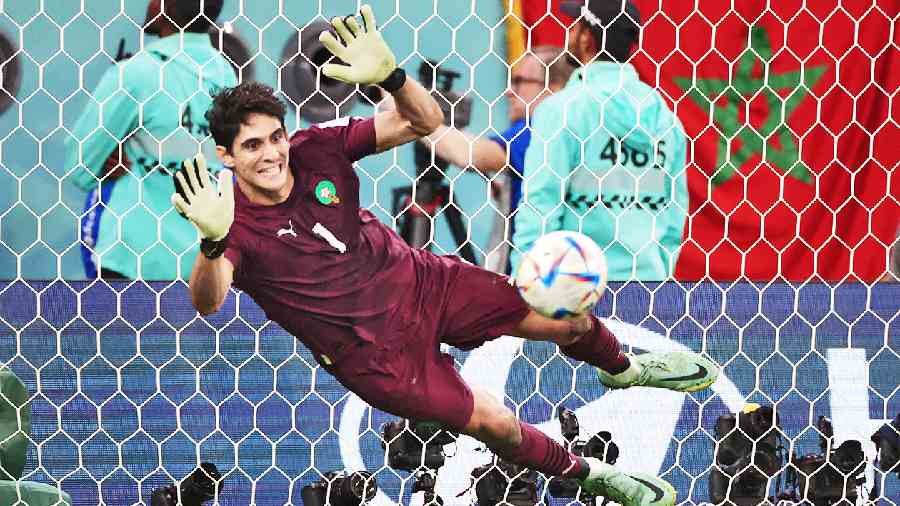Yassine Bounou had just made his second save diving to his left to deny Carlos Soler when the camera zoomed in on Walid Regragui, the Moroccan coach.
“Calm, calm,” he was shouting at Bounou. Pablo Sarabia had missed the first shot for Spain, the 2010 champions.
Next up was Sergio Busquets, whose face said he was nervous taking the shot. His weak attempt was once again saved by Bounou, this time diving to his right.
At that point, Achraf Hakimi, born in Spain and who might have been playing for Spain, stepped forward, took the measure of Unai Simon in the Spanish goal, and did a Panenka — taking the gentlest, deftest penalty imaginable, a moment of utter calm before the rapturous celebrations began.
After two arduous, attritional hours of goalless action, Morocco, the Atlas Lions, had won 3-0 on penalties and achieved what had almost seemed impossible. A place in the quarter-finals of the World Cup for the very first time. And they are still unbeaten in the competition.
The crowd went into delirium, the players rushed towards Hakimi, coach Regragui was jumping in joy on the sidelines. Spain, who had promised much with a 7-0 winning start against Costa Rica last month, were out of the World Cup at the Round-of-16 stage itself for the second successive time — they had lost, also on penalties, to hosts Russia in 2018.
A glum-faced Spain coach Luis Enrique, gracious in defeat, shook hands with Regragui. The Moroccan players meanwhile were flinging Bounou in the air. The stands had gone berserk with the Moroccan diaspora chanting and heaving in joy.
Nobody had thought they would qualify for the knockout rounds in the first place and they did that by topping the group. They were underdogs going into Tuesday’s match and they surprised everyone by knocking out the heavyweights.
On the eve of the match, Spain coach Enrique had spoken about penalties given his country’s poor record in shootouts. “It’s not about luck, penalties are all about homework,” he said.
Enrique said he gave his players a task of hitting 1000 penalties ahead of the World Cup, but admitted he was not sure if the boys had done their homework. Most likely they didn’t. Otherwise, how would you justify Soler’s miss? During his Valencia days — he now plays for Paris Saint-Germain — Soler had a hat-trick against Real Madrid by converting three from the spot.
Bounou, who plays for Sevilla, deals with the Spanish players every weekend. He was voted the best goalkeeper of La Liga last season and he knows this bunch of Spanish players inside out. In all three penalty saves, he guessed it right which proved he was the one who did his homework right.
Earlier, draped in their regal red flags and armed with darbuka goblet drums, Moroccan supporters turned the Education City Stadium into another home venue on Tuesday. Every time Spain had the ball a cacophony of boos and whistles followed. Such was the demand for tickets for this World Cup Round-of-16 match that the Moroccan football association had to arrange for 5000 more tickets. Because it’s the fans who were driving this bunch of talented Moroccan players.
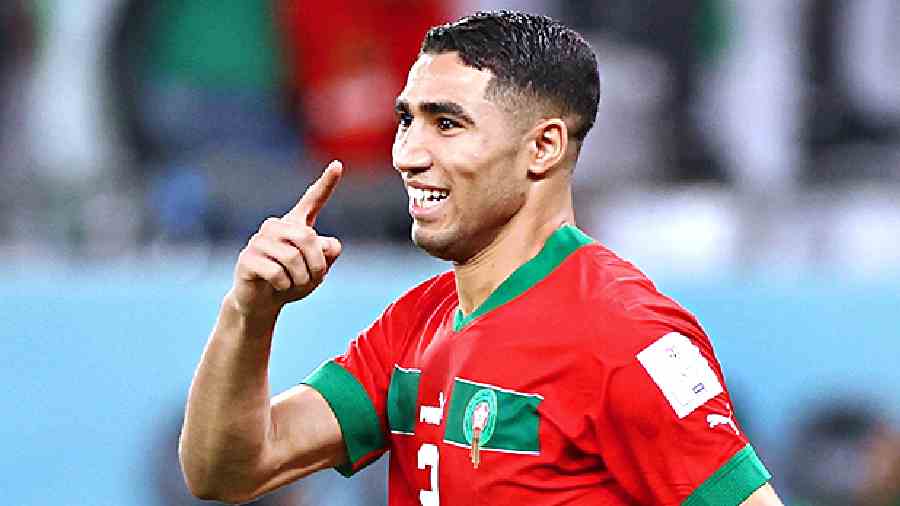
Achraf Hakimi
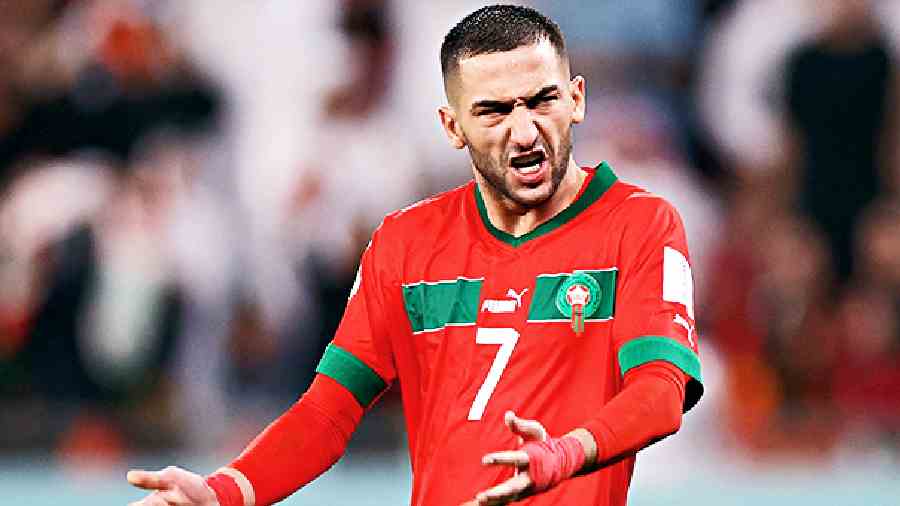
Hakim Ziyech
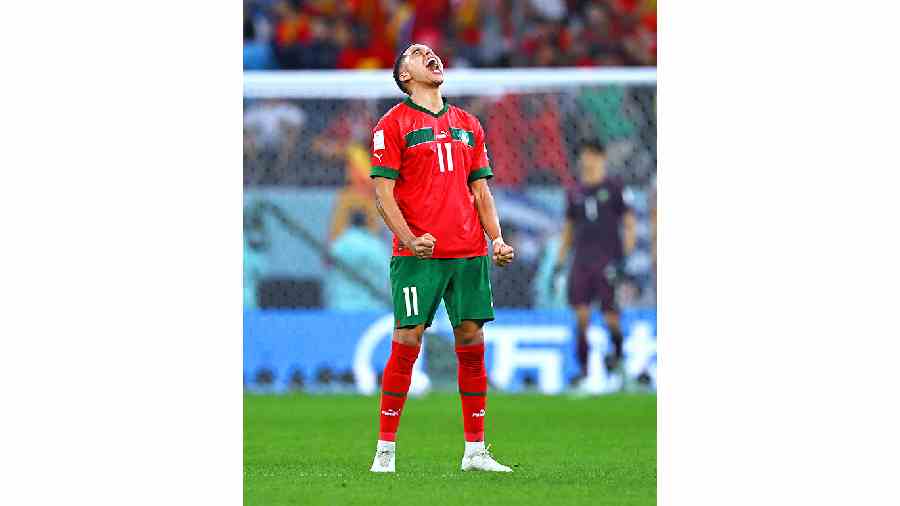
Abdelhamid Sabiri
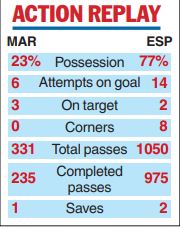
On the pitch, the red wall proved to be impenetrable as Spain tried and tried to break it down. Marco Asensio and his replacement Alvaro Morata, Ferran Torres, Dani Olmo and Pedri tried to find even a little chink but could not. Morocco’s Hakimi, the PSG defender, was unbeatable throughout the 120 minutes of action. Nayef Aguerd and Sofyan Amrabat were also brilliant.
At the other end, the Spanish defence was being tested intermittently. And their best chance came in the 104th minute. Walid Cheddira stormed through and Simon, the Spain goalkeeper, made a good save with his legs. Six minutes into the second half of extra time, he again made a run, this time from the left side of the pitch and again ran out of ideas inside the penalty box. Two Spanish defenders closed in on Cheddira and Simon made an easy save.
Most of the Moroccan footballers in this squad were born in Europe. Amrabat was born in the Netherlands, ditto with Zakaria Aboukhlal, Hakimiwas born in Madrid, Bilal ElKhannouss at Strombeek-Bever in Belgium while Abde Ezzalzouli moved to the Spanish city of Elche when he was just seven. It’s the call of the motherland that made them play for Morocco. And they have shown the world what their country is capable of.
In 1986, they had lost in the Round-of-16 to a late WestGerman goal, but this time players who have the experience of playing in topleagues did not feel overawed by the occasion. Belgium and Canada in the group stage, 2010 world champions in the knock-out round. Wayto go for the Hakimis, Ziyechsand Sabiris.

